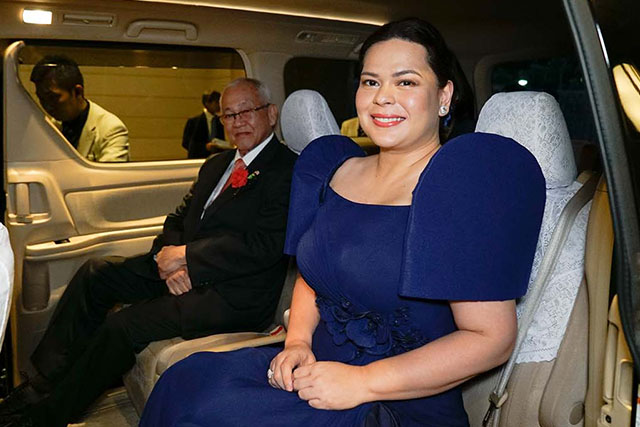(Updated 4:51 p.m.) Pro-administration pages recently shared posts calling Davao City Mayor Sara Duterte-Carpio the next “president” following her substitution of her father, President Rodrigo Duterte, in Japanese Emperor Naruhito’s enthronement.
A Facebook page created solely to campaign for the presidential daughter shared a picture of Duterte-Carpio standing in the middle of a street in Japan with the attire she wore for the state banquet.
Its caption referred to her as the next chief executive.
Blogger and Overseas Workers Welfare Administration official Mocha Uson also shared a post that featured Duterte’s eldest daughter mingling with foreign leaders and dignitaries.
Uson is an influential online promoter who has been accused of spreading false information in the past.
Its caption reads: “THE NEXT PRESIDENT IS A WOMAN? Kasama ni Mayor Inday Sara Duterte ang ilang mga World Leaders sa ginanap na State Banquet ni Prime Minister Abe Shinzo ng Japan.”
Uson shared the post from “GNBC News,” a dubious “news” page that features hashtags like “Daughterte2022” in support of Duterte-Carpio’s supposed presidential bid for the next elections.
The presidential daughter represented her father in the enthronement and banquet celebrating Emperor Naruhito’s ascension to the imperial throne last week. About 180 world leaders and representatives attended the same banquet.
Duterte, who was supposed to attend, was reported to have “unbearable pain” that made him skip the ceremonies following a motorcycle mishap.
RELATED: He’s using a cane and air purifier. Questions are being raised about Duterte’s health.
Duterte-Carpio was also spotted greeting Emperor Naruhito and Empress Masako, Japanese Prime Minister Shinzō Abe, Myanmar State Counsellor Aung San Suu Kyi and Thai Prime Minister Prayuth Chan-o-Cha, among others.
Presidential spokesperson Salvador Panelo said in reports that the Davao City mayor saw the banquet “an opportune time to network and mingle” with other state leaders.
Public presence
Duterte-Carpio’s presence in affairs reserved for national-level officials has led to speculations that she might run in the country’s presidential elections in 2022.
She was seen accompanying the chief executive on his China trip in April 2018. President Duterte claimed his daughter was invited by the Chinese government.
Duterte-Carpio was also present at the bilateral meeting of her father with Chinese President Xi Jinping, where she witnessed the signing of investment pledges.
She also accompanied him on his visit to Israel in September 2018, saying she went to prevent a repeat of the controversial kissing incident in South Korea. The trip was attended by 46 government officials and 150 businessmen.
Duterte’s grandson, Marko Digong, was also part of the trip.
The presidential daughter has been consistently rumored to succeed her father in the highest government position.
In fact, Facebook pages have been created as far back as July 2016.
As of August this year, Duterte-Carpio said that she would “pray for wisdom” before giving her final say in the matter.
“Everything is easier if it is the plan of God. Before I think about that, I should ask God first if this is for me,” she said on Pastor Apollo Quiboloy’s “Give Us This Day” program, as quoted by reports.
“So we would not make mistakes, we need to pray for wisdom on how to go about it and how to decide,” Duterte-Carpio added.
Testing waters
Some observers noted that she has been positioning herself in the national spotlight following this year’s midterm polls.
Ramon Casiple, the head of the Institute for Political and Electoral Reform, said that the presidential daughter was “testing the water.”
“She’s projecting herself as a national personality. What’s happening today is her testing the water,” he said in an interview with Reuters.
“Her image is being looked into, how people accept her. She has her own personality. She’s not being looked at as a carbon copy of her father,” he added.
Alex Funk, vice president of strategic development at 3Q Digital, told Digiday that potential candidates in the United States use digital platforms as a “testbed” and “momentum gatherer” for the 2020 elections.
Other media like television that enable candidates to reach a wider audience will come much later once they have figured out their messages online. This is because investments for ads and mileage are more expensive on TV.
Trump, for example, is testing his messages and campaign materials on Facebook, Google and Youtube, according to a report by the New York Times.

